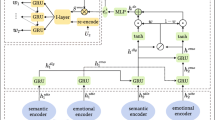Abstract
The Emotional Support Conversation (ESC) task aims to alleviate emotional distress in seekers and offer them an outlet for expressing their aggravation, garnering considerable attention in recent years. In ESC, accurately discerning the seeker’s emotional state is crucial, along with the strategic selection of appropriate support measures at various stages of the conversation to provide comfort. Previous methods fail to intricately delineate the objectives of the emotion support task, thereby hindering the supporter from crafting contextually fitting responses in each round, informed by both strategies and the user’s prevailing emotional state. To tackle this challenge, we propose a novel model, E&S-Gainer, leveraging LLaMA2’s inferential content from the conversation history to aid in training the model for improved emotional perception and strategy planning capabilities. Specifically, we devise few-shot and zero-shot prompts to harness LLaMA2 for generating stage-specific goals and pseudo-emotion labels, facilitating the separate training of the strategy-enhanced encoder and emotion-aware encoder. Additionally, we design a strategy-planning decoder explicitly incorporating strategies to guide response generation. Both automatic and human evaluations conducted on a prominent benchmark dataset attest to the superior performance of E&S-Gainer in terms of strategy selection and response generation. Our code is accessible at https://github.com/Whigle99/ES-Gainer.
Access this chapter
Tax calculation will be finalised at checkout
Purchases are for personal use only
Similar content being viewed by others
References
Bosselut, A., Rashkin, H., Sap, M., Malaviya, C., Celikyilmaz, A., Choi, Y.: COMET: commonsense transformers for automatic knowledge graph construction. In: ACL 2019, pp. 4762–4779 (2019)
Cheng, J., Sabour, S., Sun, H., Chen, Z., Huang, M.: PAL: persona-augmented emotional support conversation generation. In: ACL, pp. 535–554 (2023)
Cheng, Y., et al.: Improving multi-turn emotional support dialogue generation with lookahead strategy planning. In: EMNLP, pp. 3014–3026. Association for Computational Linguistics (2022)
Chiang, W.L., et al.: Vicuna: An open-source chatbot impressing gpt-4 with 90%* chatgpt quality. See https://vicuna lmsys. org (Accessed 14 April 2023)
Hill, C.E.: Helping Skills: Facilitating, Exploration, Insight, and Action. American Psychological Association (2009)
Huang, J.t., et al.: Emotionally numb or empathetic? evaluating how llms feel using emotionbench. arXiv preprint arXiv:2308.03656 (2023)
Jiang, S., et al.: Resprompt: Residual connection prompting advances multi-step reasoning in large language models. arXiv preprint arXiv:2310.04743 (2023)
Kim, T., Vossen, P.: Emoberta: Speaker-aware emotion recognition in conversation with roberta. CoRR abs/2108.12009 (2021). https://arxiv.org/abs/2108.12009
Li, J., Galley, M., Brockett, C., Gao, J., Dolan, B.: A diversity-promoting objective function for neural conversation models. In: NAACL HLT, pp. 110–119. The Association for Computational Linguistics (2016)
Lin, C.Y.: Rouge: a package for automatic evaluation of summaries. In: Text summarization branches out, pp. 74–81 (2004)
Lin, Z., et al.: Moel: mixture of empathetic listeners. In: EMNLP-IJCNLP, pp. 121–132 (2019)
Liu, S., et al.: Towards emotional support dialog systems. In: ACL/IJCNLP 2021, pp. 3469–3483. Association for Computational Linguistics (2021)
Loshchilov, I., Hutter, F.: Fixing weight decay regularization in adam. corr abs/1711.05101 (2017). arXiv preprint arXiv:1711.05101 (2017)
Majumder, N., et al.: MIME: mimicking emotions for empathetic response generation. In: EMNLP, pp. 8968–8979 (2020)
Papineni, K., Roukos, S., Ward, T., Zhu, W.: Bleu: a method for automatic evaluation of machine translation. In: ACL, pp. 311–318 (2002)
Peng, W., Hu, Y., Xing, L., Xie, Y., Sun, Y., Li, Y.: Control globally, understand locally: a global-to-local hierarchical graph network for emotional support conversation. In: IJCAI 2022, pp. 4324–4330. ijcai.org (2022)
Peng, W., Qin, Z., Hu, Y., Xie, Y., Li, Y.: FADO: feedback-aware double controlling network for emotional support conversation. Knowl. Based Syst. 264, 110340 (2023). https://doi.org/10.1016/j.knosys.2023.110340
Poria, S., Majumder, N., Mihalcea, R., Hovy, E.: Emotion recognition in conversation: research challenges, datasets, and recent advances. IEEE Access 7, 100943–100953 (2019)
Rashkin, H., Smith, E.M., Li, M., Boureau, Y.: Towards empathetic open-domain conversation models: a new benchmark and dataset. In: ACL 2019, pp. 5370–5381. Association for Computational Linguistics (2019)
Roller, S., et al.: Recipes for building an open-domain chatbot. In: EACL 2021, pp. 300–325 (2021)
Shen, S., et al.: Multiview contextual commonsense inference: A new dataset and task. CoRR abs/2210.02890 (2022), https://doi.org/10.48550/arXiv.2210.02890
Touvron, H., et al.: Llama: Open and efficient foundation language models. arXiv preprint arXiv:2302.13971 (2023)
Touvron, H., et al.: Llama 2: open foundation and fine-tuned chat models (2023)
Tu, Q., Li, Y., Cui, J., Wang, B., Wen, J., Yan, R.: MISC: a mixed strategy-aware model integrating COMET for emotional support conversation. In: ACL 2022, pp. 308–319. Association for Computational Linguistics (2022)
Vaswani, A., et al.: Attention is all you need. In: Advances in Neural Information Processing Systems 30: Annual Conference on Neural Information Processing Systems 2017, pp. 5998–6008 (2017)
Zhang, Y., et al.: Dialoguellm: Context and emotion knowledge-tuned llama models for emotion recognition in conversations. arXiv preprint arXiv:2310.11374 (2023)
Zhao, W., Zhao, Y., Wang, S., Qin, B.: Transesc: smoothing emotional support conversation via turn-level state transition. In: ACL, pp. 6725–6739 (2023)
Zheng, C., Sabour, S., Wen, J., Zhang, Z., Huang, M.: Augesc: dialogue augmentation with large language models for emotional support conversation. In: Findings of the Association for Computational Linguistics: ACL 2023, pp. 1552–1568 (2023)
Zhou, H., Huang, M., Zhang, T., Zhu, X., Liu, B.: Emotional chatting machine: emotional conversation generation with internal and external memory. In: AAAI 2018, pp. 730–739. AAAI Press (2018)
Zhou, P., et al.: Think before you speak: explicitly generating implicit commonsense knowledge for response generation. In: ACL 2022, pp. 1237–1252 (2022)
Acknowledgements
The work was supported by National Natural Science Foundation of China (62172086, 62272092).
Author information
Authors and Affiliations
Corresponding author
Editor information
Editors and Affiliations
Rights and permissions
Copyright information
© 2024 The Author(s), under exclusive license to Springer Nature Singapore Pte Ltd.
About this paper
Cite this paper
Yang, C., Wang, D., Feng, S., Zhang, Y., Yu, G. (2024). E&S-Gainer: An Emotion Aware and Strategy Enhanced Model for Emotional Support Conversation. In: Onizuka, M., et al. Database Systems for Advanced Applications. DASFAA 2024. Lecture Notes in Computer Science, vol 14854. Springer, Singapore. https://doi.org/10.1007/978-981-97-5569-1_5
Download citation
DOI: https://doi.org/10.1007/978-981-97-5569-1_5
Published:
Publisher Name: Springer, Singapore
Print ISBN: 978-981-97-5568-4
Online ISBN: 978-981-97-5569-1
eBook Packages: Computer ScienceComputer Science (R0)




